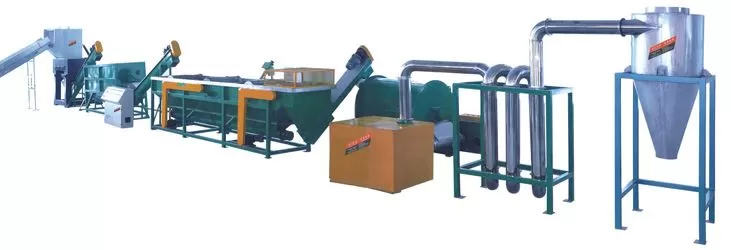Walking through city streets, have you ever noticed the discarded plastic bags, bottles, and packaging? These seemingly insignificant pieces of trash are piling up, putting immense pressure on urban environments. The world generates over 300 million tons of plastic waste annually, and less than 10% of it gets effectively recycled. Plastic pollution is silently wreaking havoc on our living spaces, seriously affecting city cleanliness and public health. So, how exactly does plastic recycling improve our urban environments?

Plastic recycling reduces the buildup of waste in cities and significantly lowers the environmental harm caused by plastic. By recycling, we reduce the need for new plastic production, lower carbon emissions, and convert waste into valuable resources. It’s not just an environmentally friendly choice—it’s also an economically smart one.
The benefits of plastic recycling go beyond that. It leads to cleaner streets, fewer pollutants, and healthier urban living. Let’s dive into the various ways plastic recycling makes our cities better.
How Does Plastic Recycling Reduce Urban Waste Accumulation?
Urban waste management systems are overwhelmed. Every day, tons of waste are sent to landfills, and a significant portion of this waste is plastic. These plastics not only take up massive landfill space but also take hundreds of years to decompose, causing long-term environmental damage.
Recycling plastic effectively reduces the volume of waste sent to landfills. Recycled plastics are shredded, cleaned, reprocessed, and transformed into new products that re-enter the market. This process not only conserves resources but also lightens the load on landfills. Less waste means a cleaner cityscape and a healthier living environment.
This circular approach ensures cities are not the end point for waste but the starting point for resource regeneration.
How Does Plastic Recycling Help Reduce Air and Water Pollution?
Discarded plastics often end up in the air, water, or soil, and are sometimes incinerated, which causes severe pollution. Burning plastic releases toxic gases that harm respiratory health, while plastic waste that enters water bodies breaks down into microplastics, affecting marine life and eventually human health.
Plastic recycling significantly mitigates these pollution issues. By recycling, plastic waste isn’t incinerated or released into the environment, preventing the emission of harmful substances. This is crucial for protecting urban air quality and water safety, allowing us to breathe cleaner air and drink purer water.
Recycling isn’t just a buzzword; it’s an action that tangibly improves our living environment.
How Does Plastic Recycling Drive Economic Development?
We often find ourselves choosing between environmental protection and economic growth. But plastic recycling shows us that we can have both. The recycling industry not only reduces environmental damage but also creates numerous jobs and economic benefits for cities.
Recycled plastic can be converted into a variety of raw materials used to create new products like building materials, packaging, and even clothing. This process not only conserves virgin resources but also reduces manufacturing costs for businesses. The extended recycling value chain injects new vitality into the economy.
For every ton of plastic recycled, we’re not just saving resources—we’re building a greener economy for our cities.
How Can Citizens Be Encouraged to Participate in Plastic Recycling?
The success of plastic recycling largely depends on public participation. Many people still have a superficial understanding of recycling, thinking it’s just a waste of time. In reality, every step of plastic recycling directly impacts our environment and our future.
Raising awareness about plastic recycling and promoting accessible recycling facilities are key. For example, setting up community recycling bins, organizing environmental awareness campaigns, or even offering incentives like rewards for recyclables can encourage residents to actively participate.
When everyone recognizes their environmental responsibility, plastic recycling can truly make a difference.
What Are the Long-Term Impacts of Plastic Recycling on Cities?
In the short term, plastic recycling reduces waste and pollution, but in the long term, it reshapes the entire urban landscape and the way cities function. A city that prioritizes recycling reflects advanced environmental thinking and a sustainable future.
Plastic recycling embeds the concept of resource circularity into everyday life, shifting away from the traditional “disposable” consumption model. It encourages businesses and consumers to seek greener alternatives, driving a societal shift towards sustainability.
The future of plastic recycling is not just about cleaner cities—it’s about smarter, greener, and more sustainable ways of living.
Conclusion
Plastic recycling not only improves urban environments but also highlights the potential for a win-win between the economy and the environment. It reminds us that every piece of discarded material has the potential to become something valuable. By taking action now, we can shape a brighter future for our cities.
Let’s make a change in our urban landscapes, starting with plastic recycling.
